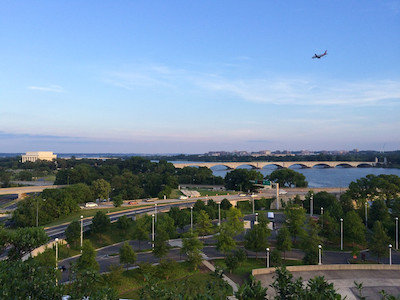
The United States Federal Government has been partially closed since December 22nd, indefinitely, until the Congress with the president’s approval can pass a budget to allocate funds for several major agencies. Since government shutdowns like the one in Washington DC are exceedingly rare elsewhere in the developed world, the procedures and cutbacks pertaining to services, travel or otherwise can be unclear.
Many are ad-hoc to an extent; based in part on how long the showshutdown will last. For those of you planning a trip to, from, or within of the United States, here’s what you need to know.
A Brief Breakdown – What Is A Shutdown?
Since 1884 The Antideficiency Act prevents the federal government of the United States from spending money that hasn’t been appropriated by Congress. The current government shutdown is a partial one, affecting roughly a quarter of the U.S. government.
Why The Shutdown Happened –Congress and the president cannot agree over the allocation of funds, in particular, regarding a border wall with Mexico. As The Balance explains,
The Constitution gives Congress the power over the federal budget. Article 1, Section 9, states, “No money shall be drawn from the Treasury, but in Consequences of Appropriations made by Law.”
The president’s role is to submit a budget proposal to Congress. He asks all federal agencies to submit their budget requests to him. The Office of Management and Budget compiles these requests. The president submits this budget to Congress. Congress usually follows this budget as a guideline to create its own budget resolution. That is used to create the appropriations bill. These bills allocate funds for different categories of government agencies.
Approximately 800,000 federal workers have been furloughed (temporary unpaid leave) until a budget is passed. Only those employees deemed “essential” are still on the job. For example, only 3% of NASA employees are at work right now but not getting paid. The Transportation Security Administration is also affected; meaning although staff are at work, they will not be paid until a federal budget is passed. No money, no funny, no government.
How Long Will The Shutdown Last?
The biggest question at the moment is: when will this shutdown end? President Donald Trump has said it could go on for years but that seems highly unlikely. Already hundreds of TSA employees are calling out sick as there’s no paycheck in sight. Since the federal government shutdown 3 times in 2018, other disruptions likely, so this is what travelers need to keep in mind.
Travel Visas To The U.S. – No Change (Theoretically)
The State Department remains operational, meaning services such as visa applications that are funded through fees should continue to be processed at relatively normal time frames. However, during the one shutdown in 1996, nearly 30,000 applications went unprocessed per day.

Travel Visas From The U.S. – No Change
Since visas applications for other countries are handled by the consular services of those governments, your tourist visas won’t be delayed or disrupted due to the U.S. shutdown.

Passport Services For U.S. Citizens – It Depends
Although the State Department is processing new passports, renewals, and page additions as normal, several of their passport offices are located within government buildings currently closed due to the shutdown. If your passport is in one of them, it won’t be processed until the shutdown ends.
U.S. National Parks – All Closed
Including the Grand Canyon, Hawaii Volcanoes National Park, Joshua Tree, Yosemite, and Virgin Islands National Park in the Caribbean. Here’s a Wikipedia page with the full list of now-closed national parks.
Smithsonian Museums And National Zoo – Closed
In Washington DC, Smithsonian Museums, plus the National Zoo, are closed during the shutdown as well as the American Indian Museum Heye Center and Cooper Hewitt in New York City. A shame, because both the National Air and Space Museum in the city and right outside, remain some of my favorite in the world.
U.S. National Forests – Partially Closed
It’s not practically possible to close all National Forests, which total 769,000 square kilometers (297,000 square miles) so rather, all campgrounds and offices must remain empty. National park rangers and security will still be working though, these are the services currently running.

Monuments, Capitol, White House Tours – Closed And Canceled Until Further Notice
Most of these US National Monuments are affected but their websites aren’t being updated during the shutdown. Here’s a list of DC monument statuses, the Statue of Liberty is open, but you’ll need to do some Internet searching to get details for most sites. Tours of the US Capitol Building, one of 5 popular tourist destinations that won’t disappoint you, are also on hiatus during the shutdown. State monuments and government buildings like the Texas Capitol Building in Austin are open however.
Will The Airlines Refund Me If My Travel Plans Are Ruined?
Having contacted a number of major airlines, most will not provide a refund or voucher even if you can prove your trip to a destination (e.g. National Park) is directly affected by the shutdown. (U.S.-based carriers seemed more sympathetic to such concerns; if you’re a furloughed employee, be sure to mention that as well.) You may though have trip insurance through the credit card you used to purchase airfare; otherwise check with your insurance provider – you may also have opted for trip protection through (e.g. Expedia), be sure to double-check that as well.
This latest government shutdown has been one of the longest in U.S. history. It seems, given the trends from the last year, more shutdowns are probable so it’s best to get travel insurance prior to a trip to or within the United States if you’re planning to see federally-funded sites. Or, if you aren’t feeling particularly impatient, make plans to visit these places with fully functioning governments.
This is an updated version of a post originally written in 2013.











